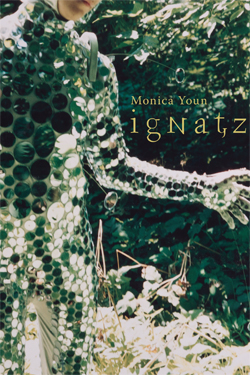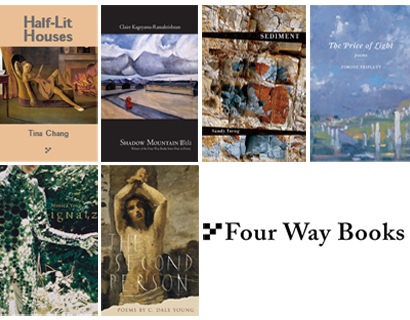
Ignatz by Monica Youn | Four Way Books 2010 | $15.95
Monica Youn’s second book of poems, Ignatz (the prize for our 2010 National Poetry Month Prompt Contest), is based on Ignatz Mouse from George Herriman’s comic strip Krazy Kat. I read the collection without prior knowledge of the comic strip, other then the basic synopsis that the cat loves the mouse, the mouse hates the cat, and the cat mistakes the mouse’s hate for love. Thus, the collection is presented as a series of unrequited love poems. The pieces often present an ambiguous and painful love, where the object of the love is never identified and never responds.
Youn’s language is lyrical and majestic, with images that evoke the highest ideals of love and quickly make the reader forget that the poems are rooted in comic strip characters. She does not hesitate to use romantic or archaic language, and modern references such as Amtrak and CEO come as a surprise when they appear. In “I-40 Ignatz”, the speaker describes the interstate with tanker trucks, stoplights, gas stations, and yet still embeds them in loftier images such as, “A cop car drowses / in the scrub / cottonwoods. Utmost.” What stands out the most throughout the collection is her use of distinctive imagery.
Images of the landscape, the body, and the strange ways in which they intersect recur throughout the collection. In “Landscape with Ignatz”, Youn describes a canyon and the sky as bodies, and the place where the canyon and the sky touch as the meeting of two bodies. Each of the six lines is vivid and unusual, including the opening one: “The rawhide thighs of the canyon straddling the knobbled blue spine of the sky.” Another piece, “Ignatz Oasis”, opens with: “When you have left me / the sky drains of color / like the skin / of a tightening fist.” These moments are not conventionally beautiful, but instead reflect the tension lying immediately under the surface. The poems are like postcards, capturing simple messages across the changing landscape without revealing the depth of emotion behind them.
Youn demonstrates great versatility in her writing, playing with different styles and formats. Most of the poems are written in the first person, invoking or addressing an unknown “you” (ostensibly, the object of the unrequited love). The titles of the poems often reveal their intent; for example, the opening poem is entitled “Ignatz Invoked”. Other pieces include “Ignatz Aubade”, “Letter to Ignatz”, “A Theory of Ignatz”, and “Ignatz: Pop Quiz”. She also experiments with line arrangements, from prose poems to a collection of fifteens words presented in three columns of five words each (“Ignatz Incarcerated”).
In general, the speaker appears to present a certain sense of simultaneous self-awareness and obliviousness. The love expressed is nuanced and complex but with no sense of reciprocity. “Ersatz Ignatz” almost suggests the object of the affection becomes irrelevant to the performance of the affection itself. The poem ends with, “He’ll enter from the west, backlit in orange isinglass, pyrite / pendants glinting from the fringes of his voice.”
The book is divided into four sections, each opening with a poem called, “Untitled (Krazy’s Song)” and ending with a poem called, “The Death of Ignatz”. These poems frame the sections, with each “Untitled (Krazy’s Song)” expressing a tangible but unattainable love and each “The Death of Ignatz” evoking a poignant sense of loss. The two modes provide a clear juxtaposition. The four poems entitled “Untitled (Krazy Song)” have an intentional saccharine quality while the four poems entitled “Death of Ignatz” are distilled precision, as the very last piece shows:
The architect leapt
from the bright
bell towerand the sea
slunk backto her cage
Throughout the collection, the pieces feel like they are building toward a greater realization that never arrives, reflecting the same sense of cyclicity and stagnation that is one of the central themes. Yet Youn manages to create a sense of complicity — the reader’s frustrations parallel that of the speaker — leading to a sense of pity for the speaker’s desperation. This sense of the dramatic, like the extreme caricatures portrayed in comic strips, heightens the carefully crafted sense of excess and futility that Youn presents in Ignatz.


